Coming attractions: A short list of the campus’s enticing fall events
This semester's rich range of cultural offerings includes a daylong cornucopia of free arts performances, as well as appearances by violin virtuoso Christian Tetzlaff, the much-loved Mark Morris Dance Group, director and outside-the-box thinker Peter Greenaway, and bestselling writer David Sheff.
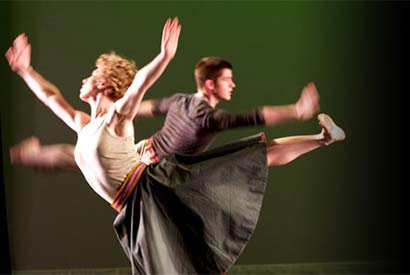
August 30, 2010
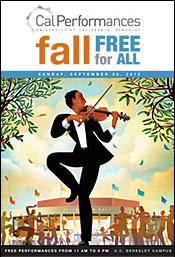
Cal Performances’ Fall Free for All, Sept. 26
This semester’s rich range of cultural offerings includes a daylong cornucopia of free arts performances, as well as appearances by violin virtuoso Christian Tetzlaff, the much-loved Mark Morris Dance Group, director and outside-the-box thinker Peter Greenaway, and bestselling writer David Sheff. Visiting speakers will present ideas to address solutions to the world’s pressing problems — energy and the health of the planet, nuclear arms, the global financial crisis, and the plight of bees.
This short list only scratches the surface; events may change, and new events will be added daily. Visit the Critic’s Choice website for a full listing and to learn the latest.
An embarrassment of artistic riches
Cal Performances sets the stage for its upcoming season with 14 free 45-minute programs at four campus venues. This Fall Free for All features the Kronos Quartet, three San Francisco Opera Adler Fellows, Diamano Couras West African Dance Company, the John Santos Sextet, Linda Tillery and the Cultural Heritage Choir, Philharmonia Baroque Orchestra, and UC Jazz Ensembles. Mark Morris Dance Group will teach audience members choreography from Looky, which MMDG will perform the following week. Singer/songwriter Melanie DeMore will lead a group sing-along. Theater company Word for Word will perform Gary Soto’s Frankie the Rooster (Sunday, Sept. 26, 11 a.m.-6 p.m., Zellerbach Hall, Wheeler Auditorium, Hertz Hall, and Lower Sproul Plaza).
Want to be reminded about an event? Click the event title to set up a reminder sent from the event calendar.
Signup to receive the coming week’s event highlights emailed to you each Monday morning.
Of musical note
Master composer and pianist Terry Riley, best known for his minimalist composition In C, inaugurates this fall’s L@TE series at the Berkeley Art Museum/Pacific Film Archive with a concert to celebrate his 75th birthday (Friday, Sept. 3, 8 p.m., Berkeley Art Museum).
The Del Sol String Quartet has commissioned works by internationally renowned composers including Tania Leon, Chinary Ung, Gabriela Lena Frank, and Joan Jeanrenaud. The two-time winners of the Chamber Music America/ASCAP First Place Award for Adventurous Programming will perform Osvaldo Golijov’s Tenebrae and Elena Kats-Chernin’s Urban Village 2 as part of BAM/PFA’s L@TE series (Friday, Oct. 1, 7:30 p.m., Berkeley Art Museum).
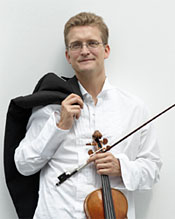
Christian Tetzlaff, (photo Alexandra Vosding), Dec. 4
The Department of Music will host a bicentennial celebration of Robert Schumann featuring its 1854 Erard piano (Friday, Oct. 22, 8 p.m., Hertz Hall). The evening will include readings, solo piano music, songs, and chamber works performed by students and faculty.
Renowned for its performances of music from Haydn to Lutoslawski, Ensemble Zellig makes its U.S. debut with Cal Performances. The program includes premieres of new works by American composers Don Freund and Gerald Shapiro and a newly commissioned piece by Berkeley Professor of Music Edmund Campion, in addition to compositions by Philippe Leroux and Pécou (Sunday, Nov. 7, 3 p.m., Hertz Hall).
Alex Filippenko, award-winning professor of astronomy, will give a pre-concert talk at the University Wind Ensemble’s Space: The Final Frontier, a performance of the music of Holst, Erb, Giroux, and Williams (Sunday, Nov. 14, pre-concert talk, 2 p.m., concert, 3 p.m., Hertz Hall).
The New York Times called German violin virtuoso Christian Tetzlaff “one of the most brilliant and inquisitive artists of the new generation.” In his Cal Performances recital, Tetzlaff will perform one of the great works written for his instrument, Bach’s Complete Sonatas and Partitas for Unaccompanied Violin (Saturday, Dec. 4, 6 p.m., Zellerbach Hall).
Movers, shakers
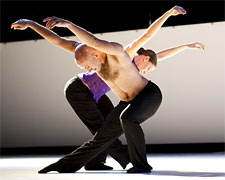
Hubbard Street Dance, (photo Todd Rosenberg), Oct. 29-30
Mark Morris Dance Group brings three West Coast premieres to Cal Performances: Behemoth (1990), the only Morris work danced in silence; Socrates (2010) — set to Erik Satie’s cantata Socrate — described by the New York Times as “simply beautiful: the most sensuously attractive new choreography”; and Looky (2007) a satire on art, artists and audiences set to Kyle Gann’s Studies for Disklavier (Thursday-Saturday, Sept. 30-Oct. 2, 8 p.m.; Sunday, Oct. 3, 3 p.m., Zellerbach Hall).
American modern-dance company Hubbard Street Dance chooses its repertoire from the works of internationally renowned choreographers. Its Cal Performances program will include pieces by two Spanish dance-makers — Nacho Duato’s Archangelo, set to Corelli and Scarlatti, and Hubbard Street resident choreographer Alejandro Cerrudo’s Deep Down Dos — as well as Czech choreographer Jirí Kylián’s 27’52”, a dance about time (Friday-Saturday, Oct. 29-30, 8 p.m., Zellerbach Hall).
In Deviations, choreographer Joe Goode and his student collaborators will look, he says, at “the ways in which we humans turn away, digress, meander, break the rules, and just generally bungle things” (Fridays and Saturdays, Nov. 12-20, 8 p.m.; Sundays, Nov. 14 and 21, 2 p.m., Durham Studio Theater).
In the wings
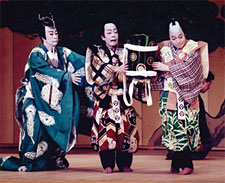
Zenshinza Theatre Company, Kabuki drama Narukami, (photo courtesy of Zenshin-za), Nov. 13
To kick off the Department of Theater, Dance, & Performance Studies’ season, director Christopher Herold reinvigorates Our Town with new staging, offering a fresh take on Thornton Wilder’s 1938 classic play on moral and social issues, set in a small New England town (Fridays and Saturdays, Oct. 8-16, 8 p.m.; Sundays Oct. 10 and 17, 2 p.m., Zellerbach Playhouse).
Cal Performances presents Benjamin Bagby who combines theater and music to bring the thousand-year-old tale Beowulf to life. Bagby will perform the ancient poem in Anglo-Saxon (with supertitles) while accompanying himself on a six-string lyre (Tuesday, Wednesday, Friday, and Saturday, Oct. 26, 27, 29, and 30, 8 p.m., Zellerbach Playhouse).
Japan’s 68-member Zenshinza Theatre Company makes its U.S. debut at Cal Performances with two programs. Kabuki drama Narukami (1724) and classic comedy Chatsubo are on the first program (Saturday, Nov. 13, 8 p.m., Zellerbach Hall). The second program features Honen and Shinran (2006), a historical drama about two influential 13th-century Japanese Buddhist priests (Sunday, Nov. 14, 3 p.m., Zellerbach Hall).
Visual delights

Saitō Ippo: Flowers of the Four Seasons, Ten Centuries of Art From the Clark Center for Japanese Art and Culture, Aug. 25-Dec. 12
Flowers of the Four Seasons: Ten Centuries of Art From the Clark Center for Japanese Art and Culture fills three galleries of the Berkeley Art Museum with 112 works dating from the late Heian period (794-1185) to the 21st century. Works are arranged thematically on topics including Buddhist art literati painting, the natural environment, everyday life, bamboo sculpture, contemporary ceramics, and works that convey a uniquely Japanese sense of humor (Wednesday-Sunday, Aug. 25-Dec. 12, 11 a.m.-5 p.m., Berkeley Art Museum).
Celebrating Mexico: The Grito de Dolores and the Mexican Revolution commemorates the 200th anniversary of Mexico’s independence from Spain and the 100th anniversary of the Mexican Revolution. The show features a selection of visual and textual documents, shedding light on the events’ participants (Monday-Friday, Sept. 2-Jan. 14, 2011, 10 a.m.-4 p.m., Bancroft Library Gallery).
Knowledge Hacking, an experimental research and exhibition project, showcases three examples of artists and scientists who investigate how we engage with the world. Projects include a proposal for a floating terrarium in Lake Merritt (planned for 2012); wearable objects that make visible the kinetic energy of human movement; and a three-dimensional topographical model of the brain’s neural architecture (reception Wednesday, Sept. 15, 4-7 p.m., Worth Ryder Gallery, 116 Kroeber Hall).
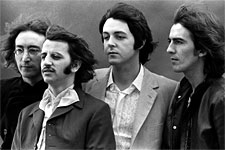
A Mad Day Out, 1968, (photo Stephen Goldblatt), Oct. 19-Feb. 1
While recording the White Album, the Beatles took a break and spent a day being photographed at seemingly random locations across London. A Mad Day Out, 1968, an exhibition of Stephen Goldblatt’s photographs from that day, captures the Fab Four’s zany energy as they roamed and cavorted through the city. Goldblatt, who has gone on to work as a director of photography for such films as Julie and Julia, Angels in America, and The Pelican Brief, will talk about the shoot at the exhibit’s reception (Friday, Nov. 12, 6 p.m. reception, 7 p.m. lecture, Graduate School of Journalism).
Chrystal of Collected Wisdom: The Arabic Chinese Calligraphy of Haji Noor Deen spotlights a calligraphic tradition little known in the West. To open the exhibit, Deen discusses the roots of his work and provides a demonstration (Monday, Nov. 15, 4 p.m., Institute of East Asian Studies, 2223 Fulton St., 6th floor). The master calligrapher will lead a workshop the following day (Tuesday, Nov. 16, 5:30 p.m., contact [email protected] to register).
Weighty words
Local literary lights Michael Pollan (In Defense of Food, The Omnivore’s Dilemma) and Michael Lewis (The Big Short, Moneyball) discuss writing, storytelling, books, and journalism in Michael x Michael, a benefit for student fellowships at the Graduate School of Journalism (Thursday, Sept. 23, 7 p.m., Berkeley Repertory Theatre).
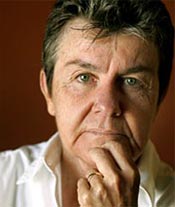
Lunch Poems: Kay Ryan, Dec. 2
Lunch Poems’ annual series kickoff features a roster of faculty and staff, each introducing and reading a favorite poem. This year’s participants: Jack Clark (rugby), Alex Filippenko (astronomy), Sheehan Grant (Library), Suzanne Guerlac (French), Nicholas Jewell (biostatistics and statistics), Shayee Khanaka (librarian, Middle Eastern Studies), Rodolfo Mendoza-Denton (psychology), Line Mikkelsen (linguistics), David Presti (molecular and cell biology), and Willis St. Hill (Housing Facilities) (Thursday, Sept. 2, 12:10 p.m., Morrison Library).
Another highlight of the Lunch Poems’ tasty fall lineup: Kay Ryan, sixteenth U.S. Poet Laureate and a California native, who most recently published The Best of It: New and Selected Poems (Thursday, Dec. 2, 12:10 p.m., Morrison Library). Reviewing Ryan’s new collection, critic Dwight Garner writes in the New York Times: “Her voice is quizzical and impertinent, funny in uncomfortable ways, scuffed by failure and loss. Her mastery, like Emily Dickinson’s, has some awkwardness in it, some essential gawkiness that draws you close.”
This semester, Story Hour, the campus’s monthly prose-reading series, features writers from diverse genres. Among the fall authors is David Sheff — named one of the world’s most influential people by Time magazine in 2000 — discussing his personal story, Beautiful Boy: A Father’s Journey Through His Son’s Addiction, which topped the New York Times bestseller list (Thursday, Oct. 14, 5 p.m., Morrison Library).
Speaking of art
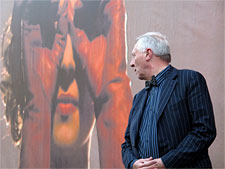
Peter Greenaway, Sept. 13-15
Filmmaker Peter Greenaway, this year’s Avenali Chair in the Humanities, will discuss his current work: Lupercyclopedia, a live environmental non-narrative, multi-screen cinema project (Monday, Sept. 13, 6 p.m., Zellerbach Playhouse), and Nine Classical Paintings Revisited, a film series that uses the latest image technology to revisit art history’s classic paintings (Tuesday, Sept. 14, 6 p.m., Zellerbach Playhouse). Greenaway will also participate in a follow-up panel discussion (Wednesday, Sept. 15, noon, Maude Fife Room, 315 Wheeler).
Founder and director of the Hemispheric Institute of Performance and Politics Diana Taylor has titled her talk SAVE AS… Memory and the Archive in the Age of Digital Technologies. A professor of performance studies and Spanish at NYU, Taylor is appearing as part of the Townsend Center’s Forum on the Humanities and the Public World (Thursday, Sept. 30, 4 p.m., Berkeley Art Museum Theater).
Financial foibles

Inside Job, part of the Center for Latin American Studies fall film series, offers a clear and outraged analysis of the lead-up to the global financial crisis of 2008 and the subsequent U.S. government bailout (Monday, Sept. 20, 7 p.m., Pacific Film Archive Theater). The screening will be followed by a Q&A session with director Charles Ferguson.
David Harvey, professor of anthropology at City University of New York, will discuss how the power of capital shapes our world in a talk entitled The Enigma of Capital and the Crises of Capitalism (Friday, Oct. 8, 4 p.m., 112 Wurster Hall). His presentation is part of the Global Metropolitan Studies lecture series, in which faculty from diverse disciplines discuss the effects of widespread urbanization.
Consumer advocate Elizabeth Warren will present the 14th annual Mario Savio Memorial Lecture, entitled Main Street First: Fixing Broken Markets and Rebuilding the Middle Class (Thursday, Oct. 28, 8 p.m., Pauley Ballroom, Martin Luther King Jr. Student Union). The inspiration and driving force behind the new Consumer Financial Protection Bureau, Warren is a professor of law at Harvard University and the author of nine books, including, with her daughter, the bestsellers All Your Worth: the Ultimate Lifetime Money Plan and The Two-Income Trap: Why Middle Class Parents Are Going Broke.
Richard Thaler, professor of behavioral science and economics and director of the Center for Decision Research in the Graduate School of Business at the University of Chicago, will explore human behavior and economics in two Hitchcock lectures: Studying Economic Behavior in Unusual Places: From Deal or No Deal to the National Football League (Tuesday, Oct. 19, 4:10 p.m.) and Rethinking Regulation After the Financial Crisis and the Oil Spill: A Behavioral Approach (Wednesday, Oct. 20, 4:10 p.m.). Both lectures will be held in the International House Chevron Auditorium.
Ashoka Fellow Bruce Cohen will lead a panel discussion on High Transparency Ethical Banking (Thursday, Nov. 18, 7 p.m., International House), as part of the International House fall series on “Democracy, Security, and Development in a Globalized World.” Ashoka is a global organization that identifies and invests in individuals with innovative and practical ideas for solving social problems.
Deconstructing war

William Perry, The Nuclear Tipping Point, Oct. 14
The Program in Critical Theory and the Townsend Center for the Humanities will host a series of collaborative public presentations on the topic “Why War?” The series is designed to reflect on human aggression, the nature of drives, the critique of sovereignty and nationalism, and the frailty and force of cultural and legal institutions. The series’ first lecture features Elisabeth Bronfen, professor of English and American studies at the University of Zurich, speaking on Hollywood’s War: Thoughts on the Cinematic Mediation of Military Conflict (Wednesday, Sept. 15, 7 p.m., Geballe Room, Stephens Hall).
The film The Nuclear Tipping Point centers around four men — all intimately involved in American diplomacy and national security over the last four decades — who are advocating a nuclear-free world: three former secretaries of state (George Shultz, Henry Kissinger, and William Perry) and former U.S. Senator Sam Nunn (Thursday, Oct. 14, 4 p.m., Banatao Auditorium, Sutardja Dai Hall). Co-sponsored by the Institute of Governmental Studies and the Institute of International Studies, the documentary’s screening will be followed by a Q&A session with Secretary Perry, the 19th U.S. Secretary of Defense, serving from 1994 to 1997.
Injustices past and present
David Cohen, director of the War Crimes Studies Center and professor of classics and rhetoric, will host a New Media Research Round Table on the Virtual Tribunal Project (Wednesday, Sept. 8, noon, 340 Moffitt Library). Through its unique integration of materials — videos of the trials, photographs, films, interviews with trial participants and ordinary citizens, newspaper accounts, expert commentary and scholarly analysis — the Virtual Tribunal will breathe life into the historical record of international criminal-justice institutions.
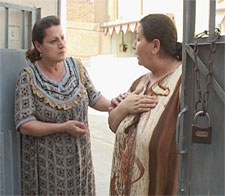
Student Films From Independent Film and Television College: Leaving, (photo Bahram Al Zuhairi) Oct. 14
In his Constitution Day Jefferson Memorial lecture, titled Japanese American Incarceration Reconsidered: 1970-2010, Roger Daniels, professor emeritus of history at the University of Cincinnati, will offer a new analysis of the World War II incarceration of Japanese Americans and its place in American culture (Tuesday, Sept. 14, 4:10 p.m., Chevron Auditorium, International House).
In 2004, two London-based Iraqi filmmakers set up a school in Baghdad to provide film training to young Iraqis, enabling them to put their thoughts and stories on the screen. The Center for Middle Eastern Studies will host Student Films From Independent Film and Television College, Baghdad (Thursday, Oct. 14, 5 p.m., 340 Stephens Hall). Despite serious security problems, students at the school have now produced 15 short documentary films that have been screened around the world.
Healthy planet, healthy people
In the School of Public Health Dean’s Colloquium Financing Health Care for All: The Taiwan Experience (Thursday, Sept. 2, 4 p.m., 159 Mulford Hall), Taiwan Minister of Health Chih-Liang Yaung will discuss how his department and its agencies are working to improve the public health, provide health education, pave the road for the healthcare industry, and participate in international health affairs.
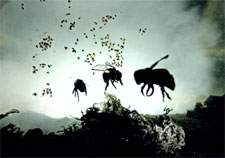
Vanishing of the Bees, Sept. 29
The Botanical Garden presents the Berkeley premiere of Vanishing of the Bees (Wednesday, Sept. 29, 6 p.m., UC Botanical Garden). The documentary examines the alarming disappearance of honeybees and the implications for the relationship between humankind and Mother Earth.
Paz Gutierrez, assistant professor of design and building technology in the department of architecture, will discuss how fostering collaboration between architecture and sciences such as bioengineering can promote innovation in sustainable building technologies for developing regions. Her talk is titled Resourcing: The New Architecture (Monday, Nov. 8, noon, 554 Barrows Hall).